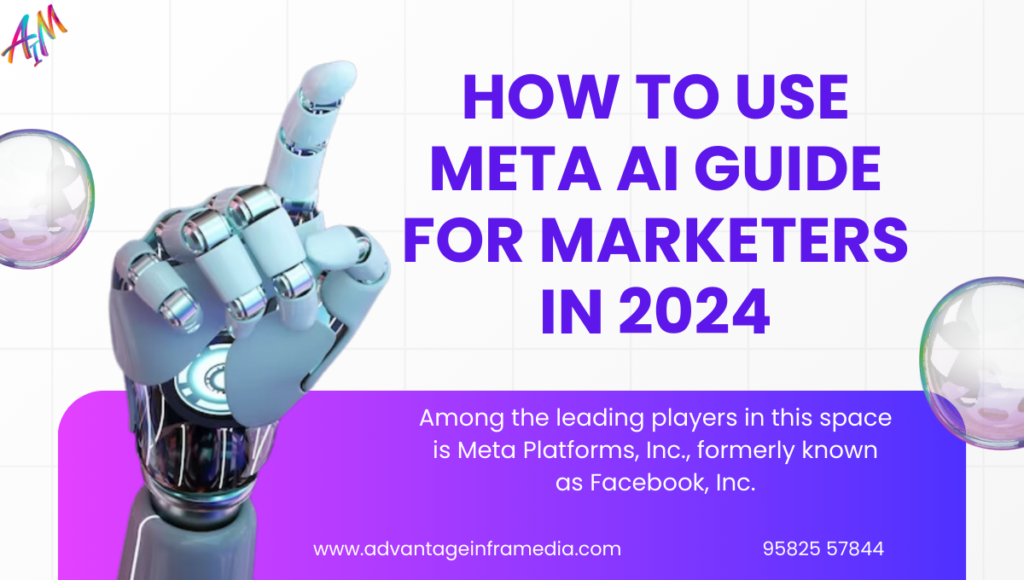Introduction
Artificial Intelligence (AI) has revolutionized numerous industries, from healthcare to finance, and continues to evolve at an unprecedented pace. Among the leading players in this space is Meta Platforms, Inc., formerly known as Facebook, Inc. Meta AI, the AI research division of Meta, is at the forefront of developing cutting-edge technologies that are transforming the way we interact with digital environments. This blog explores the journey of Meta AI, its key advancements, applications, ethical considerations, and the future trajectory of AI under Meta’s leadership.
The Evolution of Meta AI
Meta AI has its roots in Facebook AI Research (FAIR), established in 2013 with the goal of advancing the state of the art in AI through open research. Over the years, FAIR expanded its focus from basic research to include applied AI, developing tools and systems that power many of Meta’s products. The rebranding to Meta AI in 2021 signaled a broader vision aligned with the company’s pivot towards the metaverse, a virtual universe that integrates various digital experiences.
Key Milestones in Meta AI’s Journey:
- 2013: Launch of Facebook AI Research (FAIR).
- 2016: Introduction of the DeepText engine, enabling better understanding of textual content.
- 2018: Development of PyTorch, an open-source machine learning library.
- 2020: Release of BlenderBot, an advanced conversational AI model.
- 2021: Rebranding to Meta AI, focusing on AI-driven metaverse initiatives.
Advancements in Meta AI
Meta AI has made significant contributions to various domains of AI, including natural language processing (NLP), computer vision, and reinforcement learning. Below are some of the most notable advancements:
Natural Language Processing (NLP)
NLP is a critical area where Meta AI has excelled. The development of models like BERT (Bidirectional Encoder Representations from Transformers) and RoBERTa (Robustly Optimized BERT Pretraining Approach) has pushed the boundaries of language understanding. Meta AI’s contribution to NLP includes:
- BlenderBot: A conversational agent capable of engaging in more human-like conversations. BlenderBot 3.0, the latest iteration, can engage in long-term memory and contextual conversations, making it one of the most advanced chatbots to date.
- Meta’s Unified Text-to-Text Transformer (T5): A model that converts all NLP tasks into a text-to-text format, enabling a more streamlined approach to NLP.
Computer Vision
Computer vision, the field that enables machines to interpret and make decisions based on visual data, is another area where Meta AI has made strides:
- Detectron2: An open-source platform that provides state-of-the-art object detection and segmentation models. Detectron2 has become a go-to tool for researchers and developers working on computer vision tasks.
- SEER (Self-supERvised): A billion-parameter self-supervised vision model that can learn from unlabeled images, advancing the field of unsupervised learning in computer vision.
Reinforcement Learning
Reinforcement learning (RL) is a branch of AI where agents learn to make decisions by interacting with their environment. Meta AI’s RL research has led to breakthroughs in:
- OpenAI Gym Integration: Enhancing PyTorch with tools that make it easier to develop RL algorithms.
- Using RL in the Metaverse: Meta AI is applying RL techniques to develop intelligent agents that can navigate and interact within the metaverse, creating more dynamic and responsive virtual environments.
AI Ethics and Fairness
Meta AI is committed to developing AI technologies that are ethical and fair. This commitment is reflected in their work on:
- Fairness in AI: Developing algorithms that minimize bias and ensure equitable outcomes for all users. Meta AI has published numerous papers on fairness, emphasizing the importance of transparency and accountability in AI systems.
- AI for Social Good: Meta AI is involved in projects that use AI to address societal challenges, such as climate change, healthcare, and education.
Applications of Meta AI
Meta AI’s research is not confined to theoretical advancements; it has real-world applications that are already impacting millions of users globally.
Social Media
AI powers many of the features on Meta’s platforms, including Facebook, Instagram, and WhatsApp. Examples include:
- Content Moderation: AI systems detect and remove harmful content, such as hate speech, misinformation, and graphic violence.
- Personalization: AI algorithms curate content on users’ feeds, making recommendations based on user behavior and preferences.
- Language Translation: AI-driven translation tools enable seamless communication between users from different linguistic backgrounds.
The Metaverse
The metaverse represents a new frontier where AI will play a crucial role in creating immersive and interactive experiences. Meta AI is working on:
- Virtual Avatars: AI-generated avatars that can mimic human expressions and gestures, providing a more lifelike interaction in virtual environments.
- Smart Environments: Using AI to develop responsive environments within the metaverse that adapt to users’ actions and preferences in real-time.
Healthcare
AI has the potential to transform healthcare by improving diagnostics, personalizing treatment plans, and enhancing patient care. Meta AI’s contributions include:
- AI-Assisted Diagnostics: Developing AI models that can analyze medical images to detect diseases like cancer at an early stage.
- Mental Health: AI-driven tools that can monitor user behavior on social platforms to identify signs of mental health issues and provide timely interventions.
Commerce
AI is revolutionizing the e-commerce industry by offering more personalized shopping experiences. Meta AI’s work in this domain includes:
- Visual Search: Enabling users to search for products using images rather than text, enhancing the shopping experience.
- Personalized Recommendations: Using AI to analyze user preferences and behavior to recommend products that are more likely to interest them.
Education
AI is also playing a pivotal role in transforming education. Meta AI is contributing to this by:
- AI Tutors: Developing AI-driven tutoring systems that provide personalized learning experiences for students.
- Content Creation: Using AI to generate educational content, making it easier for educators to create engaging and effective teaching materials.
Ethical Considerations
As AI continues to permeate various aspects of life, ethical considerations become increasingly important. Meta AI is actively engaged in addressing the ethical challenges posed by AI.
Bias and Fairness
One of the most pressing issues in AI is the potential for bias, which can lead to unfair treatment of individuals or groups. Meta AI is tackling this issue by:
- Bias Detection and Mitigation: Developing tools to detect and mitigate bias in AI systems, ensuring that they produce fair outcomes.
- Inclusive AI: Ensuring that AI systems are trained on diverse datasets that reflect the full spectrum of human experiences and perspectives.
Privacy and Security
As AI systems collect and analyze vast amounts of data, privacy and security concerns are paramount. Meta AI is addressing these concerns by:
- Data Privacy: Implementing techniques like differential privacy to protect users’ data while allowing AI systems to learn from it.
- Secure AI Systems: Ensuring that AI systems are robust and secure against adversarial attacks that could compromise their integrity or harm users.
Transparency and Accountability
Another key ethical consideration is the transparency of AI systems. Meta AI is committed to:
- Explainable AI: Developing AI models that are interpretable and whose decisions can be understood by humans, fostering trust and accountability.
- Open Research: Sharing research findings and tools with the broader AI community to promote transparency and collaboration.
The Future of Meta AI
Looking ahead, Meta AI is poised to play a central role in shaping the future of AI and the digital world. Key areas of focus include:
The Metaverse
As Meta continues to build the metaverse, AI will be integral to its development. Future advancements may include:
- Advanced AI Avatars: Creating avatars that are indistinguishable from humans in terms of appearance and behavior.
- Intelligent Environments: Developing environments that can autonomously adapt to users’ needs, creating a truly personalized experience.
AI for Social Good
Meta AI is likely to expand its focus on using AI for social good, addressing global challenges such as:
- Climate Change: Using AI to develop solutions for mitigating the impacts of climate change, such as optimizing energy use and reducing emissions.
- Global Health: Expanding AI’s role in healthcare to address global health challenges, particularly in underserved regions.
Ethical AI
As AI becomes more pervasive, Meta AI will continue to lead the charge in developing ethical AI systems. Future efforts may include:
- AI Governance: Establishing frameworks for governing AI development and deployment, ensuring that AI benefits all of humanity.
- Human-AI Collaboration: Enhancing the collaboration between humans and AI, creating systems that augment human capabilities rather than replacing them.
Meta AI in Depth: Case Studies and Real-World Applications
Meta AI’s contributions go beyond theoretical research, impacting a wide range of industries and creating new possibilities for innovation. Below, we explore specific case studies that highlight how Meta AI’s technologies are applied in real-world scenarios.
Case Study 1: Enhancing Content Moderation on Social Media Platforms
One of the most critical challenges for Meta’s social media platforms, including Facebook and Instagram, is content moderation. With billions of users generating vast amounts of content every day, manually moderating posts, comments, and messages is nearly impossible. Meta AI has addressed this challenge by developing sophisticated AI systems that can automatically detect and remove harmful content, such as hate speech, misinformation, and explicit material.
Key Technologies:
- DeepText: An NLP engine capable of understanding the meaning and context of text in over 20 languages. DeepText powers content moderation by analyzing textual content to detect harmful or inappropriate language.
- Vision AI: AI models like SEER (Self-supERvised) are used to analyze images and videos, identifying and flagging content that violates community standards.
- Multimodal AI: Combining text, image, and video analysis to provide a holistic understanding of content, enabling more accurate moderation.
Impact:
- Efficiency: AI-driven moderation has significantly reduced the time required to identify and remove harmful content.
- Scalability: The AI systems can operate at scale, moderating content across billions of posts in real-time.
- User Safety: By effectively removing harmful content, Meta AI enhances user safety and fosters a more positive online environment.
Case Study 2: Revolutionizing E-Commerce with AI
Meta AI is also making significant strides in the e-commerce industry, particularly through personalized shopping experiences and advanced visual search capabilities. These innovations are reshaping how consumers interact with online stores and discover new products.
Key Technologies:
- AI-Powered Recommendations: Meta AI uses machine learning algorithms to analyze user behavior, preferences, and purchase history to deliver personalized product recommendations. These recommendations appear in users’ social media feeds, ads, and shopping interfaces.
- Visual Search: By leveraging computer vision technologies, Meta AI allows users to search for products using images. For example, a user can upload a photo of an item they like, and the AI will identify and suggest similar products available for purchase.
Impact:
- Increased Sales: Personalized recommendations and visual search have led to higher conversion rates and increased sales for online retailers.
- Enhanced User Experience: Shoppers enjoy a more tailored and intuitive experience, making it easier to find products that match their tastes and needs.
- Data-Driven Insights: Retailers benefit from AI-driven insights into consumer behavior, helping them optimize inventory, marketing strategies, and pricing.
Case Study 3: AI in Healthcare – Early Disease Detection
Meta AI’s research has extended into the healthcare sector, where AI technologies are being used to enhance diagnostic accuracy and early disease detection. By analyzing medical data, AI models can identify patterns and anomalies that might be missed by human practitioners.
Key Technologies:
- Medical Imaging Analysis: Meta AI has developed machine learning models capable of analyzing medical images, such as X-rays, MRIs, and CT scans, to detect diseases like cancer, heart disease, and neurological disorders.
- Predictive Analytics: AI models are used to predict patient outcomes based on historical data, enabling earlier interventions and personalized treatment plans.
- Natural Language Processing in Healthcare: NLP is used to analyze patient records, clinical notes, and research papers, extracting valuable insights that can inform treatment decisions.
Impact:
- Improved Accuracy: AI models have demonstrated the ability to match or exceed human accuracy in diagnosing certain conditions, reducing the likelihood of misdiagnosis.
- Early Detection: By identifying diseases at an earlier stage, AI enables more effective treatment, improving patient outcomes and survival rates.
- Operational Efficiency: AI-driven tools help healthcare providers manage large volumes of data, streamline workflows, and reduce the burden on medical staff.
Collaborations and Open Research
Meta AI is committed to advancing the field of AI through collaboration and open research. By partnering with academic institutions, industry leaders, and research organizations, Meta AI fosters a culture of innovation and knowledge sharing.
Partnerships with Academic Institutions
Meta AI collaborates with leading universities and research institutes around the world, funding research projects, hosting workshops, and providing access to its AI tools and datasets. These collaborations help bridge the gap between academic research and industry applications, accelerating the development of new AI technologies.
Examples:
- MIT, Stanford, and UC Berkeley: Meta AI has partnered with these institutions on various research initiatives, focusing on areas such as reinforcement learning, computer vision, and ethical AI.
- AI4All: A partnership aimed at increasing diversity and inclusion in AI by providing education and mentorship to underrepresented groups.
Open-Source Contributions
Meta AI has a strong commitment to the open-source community, contributing tools, libraries, and datasets that empower researchers and developers worldwide. Notable open-source projects include:
- PyTorch: One of the most popular deep learning frameworks, PyTorch is widely used in both academia and industry. Meta AI continues to support and develop PyTorch, adding new features and improving usability.
- Detectron2: An open-source platform for object detection and segmentation, providing state-of-the-art models for computer vision research.
- Fairseq: A sequence-to-sequence learning toolkit for tasks like machine translation, text summarization, and speech recognition.
AI for Social Good Initiatives
Meta AI is actively involved in initiatives that leverage AI for social good. These projects focus on addressing global challenges such as climate change, healthcare accessibility, and disaster response.
Examples:
- AI for Climate Change: Collaborating with environmental organizations to develop AI models that can monitor deforestation, predict extreme weather events, and optimize energy consumption.
- Disaster Response: Using AI to analyze satellite imagery and social media data to provide real-time information during natural disasters, aiding in rescue and relief efforts.
Research Challenges and Ethical Considerations
As Meta AI continues to push the boundaries of what AI can achieve, it also faces significant research challenges and ethical considerations. Addressing these issues is crucial to ensuring that AI technologies are developed responsibly and benefit all of society.
Addressing Bias in AI
One of the most critical challenges in AI research is the potential for bias in AI models. Bias can occur at various stages, from data collection to model training, leading to unfair or discriminatory outcomes.
Strategies for Mitigation:
- Diverse Datasets: Ensuring that AI models are trained on diverse and representative datasets to minimize bias.
- Bias Detection Tools: Developing tools that can automatically detect and quantify bias in AI models, enabling researchers to address these issues proactively.
- Fairness Audits: Conducting regular audits of AI systems to assess their fairness and identify any potential biases.
Ensuring Privacy and Security
As AI systems become more integrated into daily life, privacy and security concerns become increasingly important. Meta AI is actively working on solutions to protect user data and ensure the security of AI systems.
Approaches:
- Differential Privacy: Implementing techniques that allow AI models to learn from data without exposing individual user information, preserving privacy while still enabling valuable insights.
- Secure AI Systems: Developing robust AI models that are resistant to adversarial attacks, which can manipulate AI systems to produce incorrect or harmful outcomes.
- Data Minimization: Reducing the amount of data collected and processed by AI systems to minimize the risk of data breaches and unauthorized access.
Achieving Transparency and Explainability
Transparency and explainability are crucial for building trust in AI systems. Users and stakeholders need to understand how AI models make decisions, especially in high-stakes scenarios like healthcare, finance, and law enforcement.
Solutions:
- Explainable AI (XAI): Developing AI models that can provide explanations for their decisions in a way that is understandable to humans. This is particularly important in areas like healthcare, where practitioners need to understand the rationale behind AI-driven diagnoses.
- Transparency in AI Development: Meta AI is committed to being transparent about the development and deployment of its AI systems, publishing research papers, and engaging with the public and policymakers.
Future Scenarios: The Role of Meta AI in the Next Decade
As we look ahead to the next decade, Meta AI is poised to play a pivotal role in shaping the future of technology and society. Below, we explore potential scenarios that could emerge as Meta AI continues to evolve.
The Evolution of the Metaverse
The metaverse represents a new frontier in digital experiences, and AI will be central to its development. In the coming years, we may see:
- Fully Immersive Virtual Worlds: AI-driven environments that are indistinguishable from reality, offering users unprecedented levels of immersion and interaction.
- AI-Powered Creators: Artists, designers, and developers using AI tools to create content for the metaverse, from virtual landscapes to interactive narratives.
- Collaborative AI Agents: Intelligent agents that can assist users in the metaverse, helping them navigate virtual spaces, discover content, and interact with other users.
AI-Driven Healthcare
AI has the potential to revolutionize healthcare, making it more personalized, accessible, and effective. Future advancements may include:
- AI-Enabled Precision Medicine: Using AI to analyze genetic data, lifestyle factors, and medical history to create highly personalized treatment plans.
- Virtual Health Assistants: AI-driven virtual assistants that can monitor patients’ health, provide medical advice, and even perform routine check-ups.
- Global Health Initiatives: Leveraging AI to address healthcare challenges in developing countries, such as improving access to diagnostics and treatment.
AI and the Future of Work
AI will undoubtedly reshape the future of work, with significant implications for jobs, productivity, and economic growth. Possible developments include:
- AI-Augmented Workforce: AI tools that enhance human capabilities, enabling workers to perform complex tasks more efficiently and creatively.
- Reskilling and Education: As AI automates routine tasks, there will be a growing need for reskilling and education programs to prepare workers for new roles in the AI-driven economy.
- Ethical AI in the Workplace: Ensuring that AI systems used in hiring, performance evaluation, and management are fair, transparent, and free from bias.
Ethical AI Governance
As AI becomes more powerful and pervasive, the need for ethical governance will become increasingly important. Potential future developments include:
- Global AI Governance Frameworks: International agreements and standards that govern the development and use of AI, ensuring that it is used responsibly and for the benefit of all.
- AI Ethics Boards: Organizations and companies may establish ethics boards to oversee AI development, ensuring that ethical considerations are integrated into the design and deployment of AI systems.
- Public Engagement: Involving the public in discussions about AI ethics, transparency, and governance, ensuring that diverse perspectives are considered in the decision-making process.
Conclusion: Meta AI and the Future of Humanity
Meta AI is at the forefront of one of the most transformative technologies of our time. From revolutionizing industries and improving daily life to addressing some of the world’s most pressing challenges, the impact of Meta AI is far-reaching and profound.
As we look to the future, the potential of AI is both exciting and daunting. The decisions made by researchers, developers, policymakers, and society as a whole will shape the trajectory of AI and its role in the world. Meta AI’s commitment to open research, collaboration, and ethical AI development positions it as a leader in this field, guiding the way toward a future where AI is a force for good.
In the coming years, Meta AI will continue to push the boundaries of what is possible, exploring new frontiers in the metaverse, healthcare, education, and beyond. By addressing the ethical challenges and fostering a culture of innovation, Meta AI is helping to ensure that the future of AI is one that benefits all of humanity.
The journey is just beginning, and the possibilities are limitless. Whether through enhancing human creativity, solving global problems, or creating new forms of interaction and connection, Meta AI is set to play a pivotal role in shaping the future of our digital and physical worlds.




